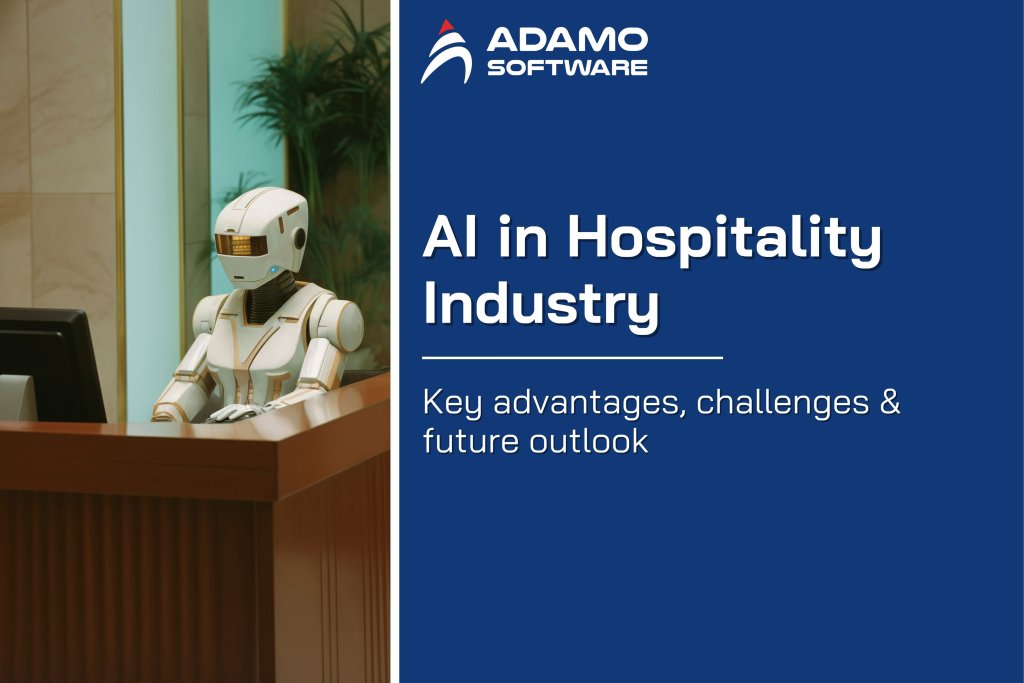Hotel revenue management software market: Challenges & upcoming trends
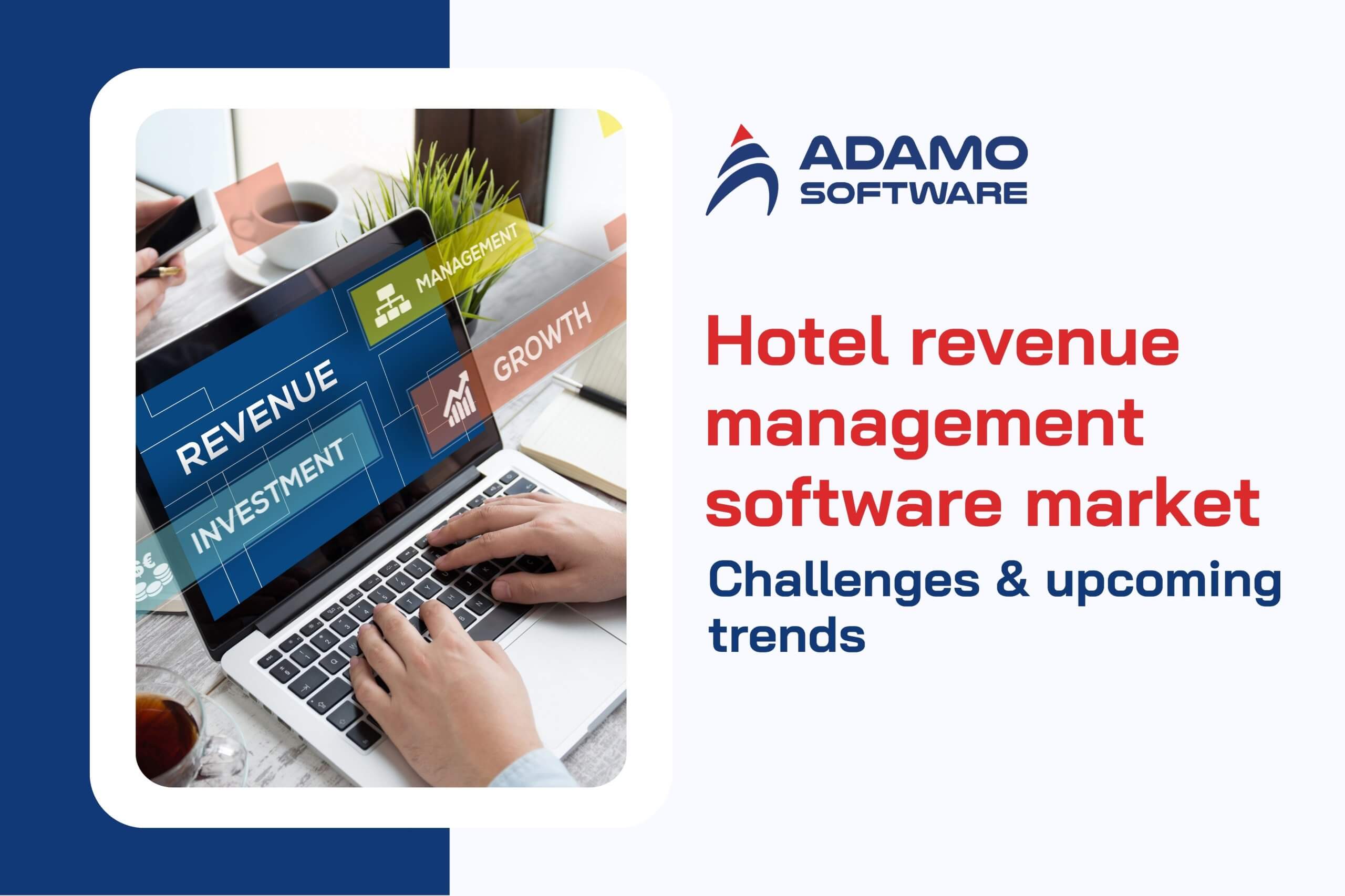
Navigating today’s fast-paced hospitality world requires more experience, precision, and smart technology. Customer travel demand and room rates are constantly changing due to seasonal travel trends, local cultural events, and competitor activity. Hotels and holiday rentals must maintain profitability while remaining competitive. This challenge makes revenue management software (RMS) a game-changer.
RMS is a reliable co-pilot, using real-time data and predictive analytics to optimize room rates. It improves occupancy rates and maximizes revenue. By automating complex pricing decisions, RMS helps hoteliers make faster, smarter moves in a dynamic market.
In this article, we explore the hotel revenue management software market, examine the key challenges in hotel revenue management, and highlight emerging industry trends. From adapting to changing markets to competing with dynamic pricing, RMS plays a critical role. Choosing the right technology partner can unlock profits and ensure long-term success.
I. Hotel revenue management software market: Current insights
In 2023, the hotel revenue management system market is estimated to be worth $16.41 billion. By 2030, it is expected to grow to $29.43 billion, achieving a compound annual growth rate (CAGR) of 8.7% from 2024 to 2030.
The industry segment includes software solutions that aim to increase profitability and optimize revenue generation for hotels and hospitality businesses. This is known as the Hotel Revenue Management System (RMS) Market. These systems use advanced analytics, predictive algorithms, and dynamic pricing techniques. To assist hoteliers in making informed decisions regarding room pricing, inventory distribution, and overall revenue strategy.
Hotel managers can efficiently manage room availability and pricing, enabling them to respond quickly to changes in demand, industry trends, or competitor activities. RMS systems also support dynamic pricing strategies, allowing hotels to adjust rates flexibly based on demand, seasonal patterns, and other factors. Hotels can make more informed pricing decisions by leveraging historical data and real-time insights.
Furthermore, key features like demand forecasting, inventory control, price optimization, and performance analysis play a vital role in a hotel RMS. Demand forecasting helps predict future trends with accuracy by utilizing market data, past performance, and predictive modeling techniques.
Additionally, inventory management ensures that room inventory is optimally distributed across multiple distribution channels to optimize revenue potential. Setting the best hotel rates based on competitive pricing, demand dynamics, and other relevant variables is known as price optimization. Revenue management tactics can be continuously improved and refined through performance analytics. It provides insights into revenue models, market segments, and the effectiveness of pricing programs.
You can explore more about the overview of channel management software here.
II. How to enhance cash flow using hotel revenue management software
In the day-to-day running of a hotel, getting bogged down in data can be exhausting. By analyzing the numbers and events across your entire hotel operation, you will find many opportunities to increase revenue streams and drive business success. Often, just a small change can greatly impact your annual revenue.
To help increase your net profit, use these data strategies at your hotel. It will also help you run your business more efficiently and improve your cash flow.
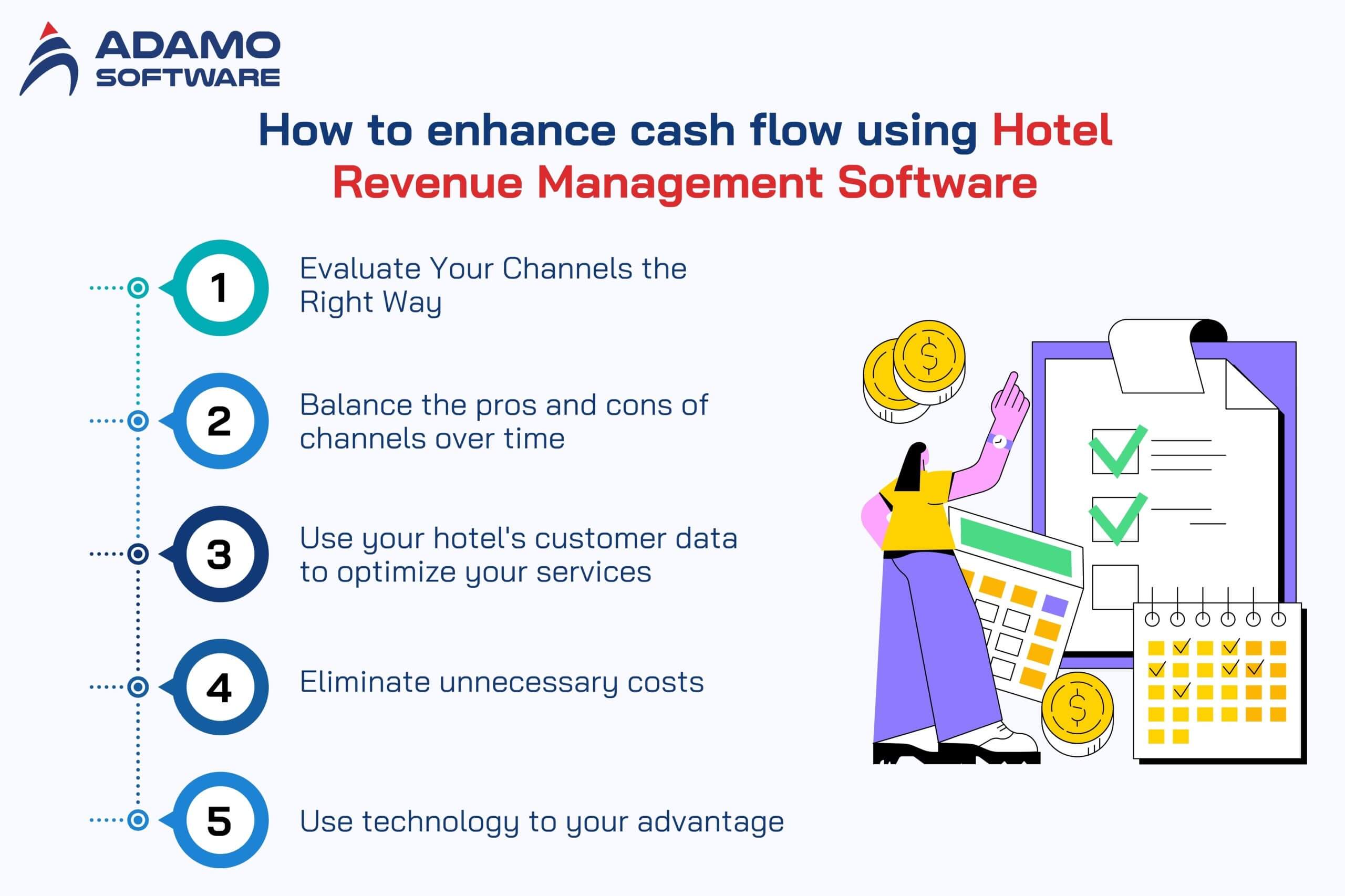
1. Evaluate Your Channels the Right Way
Regarding your hotel distribution channels, you need to identify the ones that drive the highest demand and number of bookings.
However, to know the most valuable channels, you need to look at them from a net revenue perspective. This means you must consider how much profit you get from each channel after all the associated costs have been taken out. Specifically, what is the average daily rate? Once you find the answer, it will be easier to identify the best distribution channel. If you find that your most profitable channel is the one you are less focused on, you can increase the demand for this higher-quality channel. Making each booking more valuable for your business. Staying updated on the hotel revenue management software market can help you better understand which channels yield the highest revenue potential.
2. Balance the pros and cons of channels over time
Next, you must constantly monitor the performance of your marketing and distribution channels. If you have been running a perfect campaign for 2 or 3 years, you cannot ignore it. You need to investigate whether it still brings you the same benefits today. However, It is possible that spending has increased and revenue has decreased.
On the other hand, some channels may have additional benefits, such as brand recognition, which can compensate for the lack of revenue. For example, advertise your services on websites that offer holiday deals. The price will be low, and the commission may be high, but the level of exposure will be significant. However, in this case, you should also consider whether it is worth appearing on such a website and for how long. By leveraging insights from the hotel revenue management software market, you can make more informed decisions on optimizing your resource allocation across channels.
3. Use your hotel’s customer data to optimize your services
The insights you can gain from each customer who has booked and stayed at your hotel are invaluable. This information allows you to discover new trends about your customers, their preferences, how long they typically stay, their travel purposes, etc. You can start meaningfully shaping a successful marketing and distribution strategy from here.
On the other hand, you will be able to identify any unnecessary strategies and replace them with a more targeted approach by using tactics such as email or social media campaigns to increase your conversion rates. This saves you money and generates revenue overall.
4. Eliminate unnecessary costs
Eliminating unnecessary or irrelevant costs is very important. This will help you save money and focus your budget on more important things. Your hotel can consume a lot of electricity which can cost you a lot of money.
It is relatively easy to fix these costs. For example, you can determine how much time your guests spend inside and outside their rooms and when. This allows you to adjust your ventilation and air conditioning systems accordingly. The same can be said for when you use your appliances. You should also consider when and where you must always turn on the lights throughout your hotel.
5. Use technology to your advantage
Your hotel’s technology, like a channel manager or booking engine and your website, can provide the data you need to make informed decisions. Plus, it can run reports and generate insights you can act on immediately.
Unsurprisingly, a revenue management system is one of the best ways to track your revenue, profits, and data. It can ensure that your hotel’s revenue management is scientific and offers real-time automation. In fact, staying on top of trends in the hotel revenue management software market can help you choose the most effective tools to boost your revenue and improve overall operational efficiency.
III. Challenges to consider in hotel revenue management software development
As the hospitality industry changes, many hotels increasingly use technology to improve operational efficiency and increase revenue. Revenue Management Software (RMS) is a powerful tool for hotel businesses. Hotels can optimize pricing, maximize room revenue, and stay competitive. However, like any technology, integrating RMS comes with its own set of challenges.
In this section, we will explore the common challenges that hotels face when implementing Revenue Management Software. We will also discuss strategies to overcome these barriers for a successful and seamless implementation.
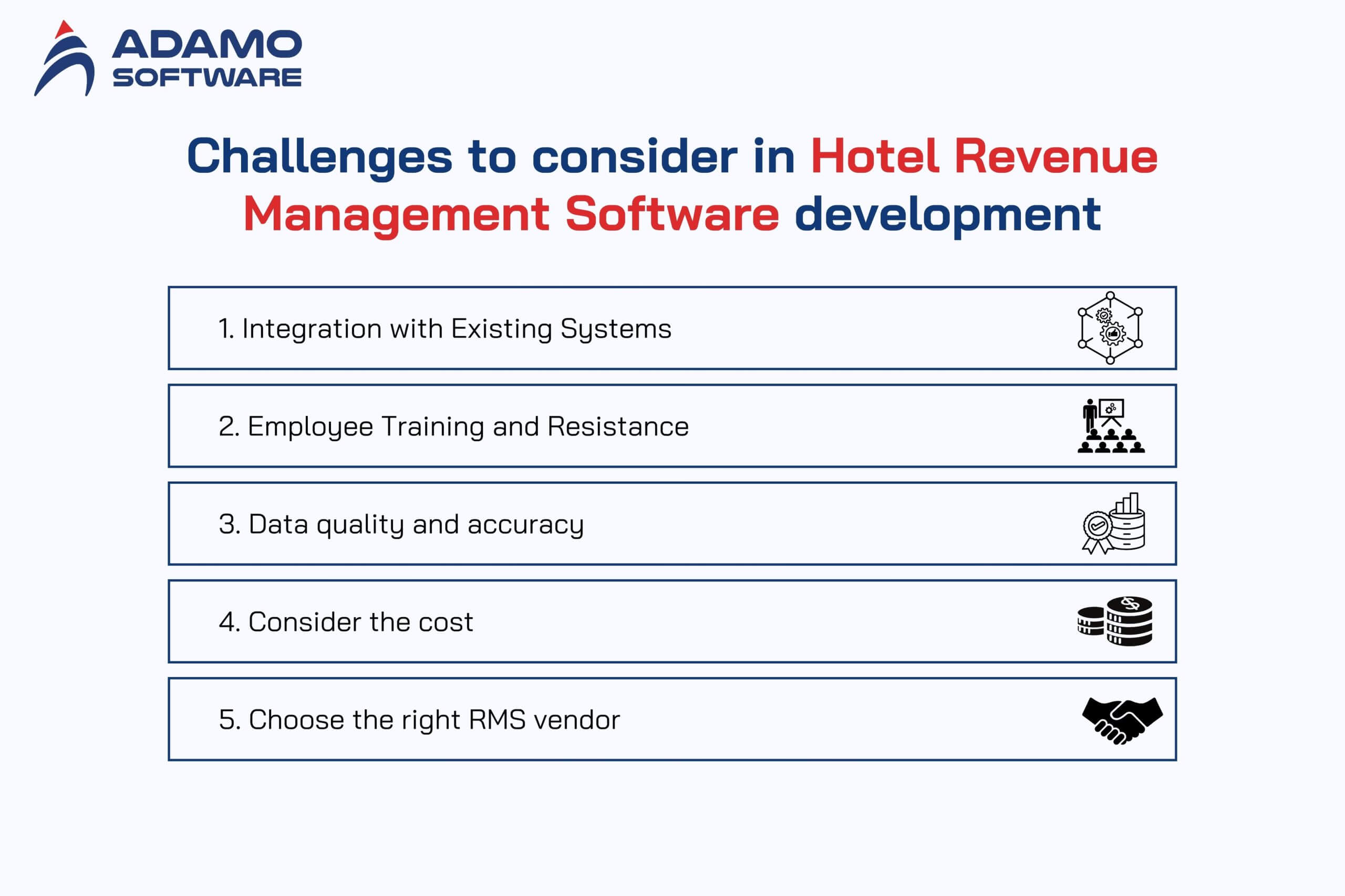
1. Integration with Existing Systems
– Challenges: Many hotels integrate with systems such as property management, booking engines, and other operations. Seamlessly combining an RMS with these existing systems can be a complex task.
– Strategy: You need to prioritize RMS solutions that offer easy integration. Also, choose vendors providing strong support and collaboration during the integration process. Finally, thorough testing must be conducted to ensure smooth interoperability.
2. Employee Training and Resistance
– Challenges: A common challenge when implementing new technology is employee resistance to change. When they first get used to it, they are likely to need to be more familiar with the functions of the RMS, leading to reluctance to adopt the new system.
– Strategy: To address this challenge, you should invest in comprehensive training programs for employees at all levels. Don’t forget to highlight the benefits of the RMS, emphasizing how it can simplify employees’ tasks and contribute to overall efficiency. It is important to foster a culture of continuous learning to encourage employees to participate in the new system. Following trends in the hotel revenue management software market can also provide insights into training materials and best practices for system adoption.
3. Data Quality and Accuracy
– Challenge: For an RMS to work well, it needs accurate and reliable data. When the data is inconsistent or incorrect, it can result in poor pricing decisions and hurt revenue optimization.
– Strategy: Set up strong data cleansing procedures before integrating the RMS. Make sure to audit and update data sources regularly to keep them accurate. Use data quality tools and set up protocols for continuous data management to maintain the system’s effectiveness. Insights from the hotel revenue management software market can guide you in selecting the best data management tools to complement your RMS.
4. Consider the Cost
– Challenges: The upfront costs associated with developing an RMS can be a significant barrier for some hotels, especially smaller properties with limited budgets. – Strategy: It is best to conduct a thorough cost-benefit analysis to understand the long-term advantages of an RMS. Additionally, explore flexible pricing models vendors offer, such as subscription-based or revenue-sharing models. Don’t forget to consider the potential return on investment regarding increased revenue and operational efficiency. By researching the hotel revenue management software market, you can find cost-effective solutions that fit your budget while delivering optimal results.
5. Choose the right RMS vendor
– Challenges: The hotel revenue management software market is flooded with different vendors, each offering unique features. Therefore, choosing the right vendor for your specific needs can be daunting.
– Strategy: The best solution is prioritizing vendors with a proven track record in the hospitality industry. You can look for recommendations and read reviews about them to find out. Additionally, you can ask them to do a demo similar to your project to evaluate the usability and compatibility of the RMS. Choose a vendor that offers continuous support, updates, and scalability to meet the changing needs of your hotel.
IV. Trends to look forward in hotel revenue management software market
Changing customer behavior and technological breakthroughs in the dynamic hospitality industry are driving changes in hotel revenue management systems. Emerging trends highlight a growing focus on data analytics and customized pricing. Artificial intelligence integration further boosts revenue. Online travel agencies are reshaping hotel strategies worldwide. Direct bookings are becoming increasingly important for revenue growth.
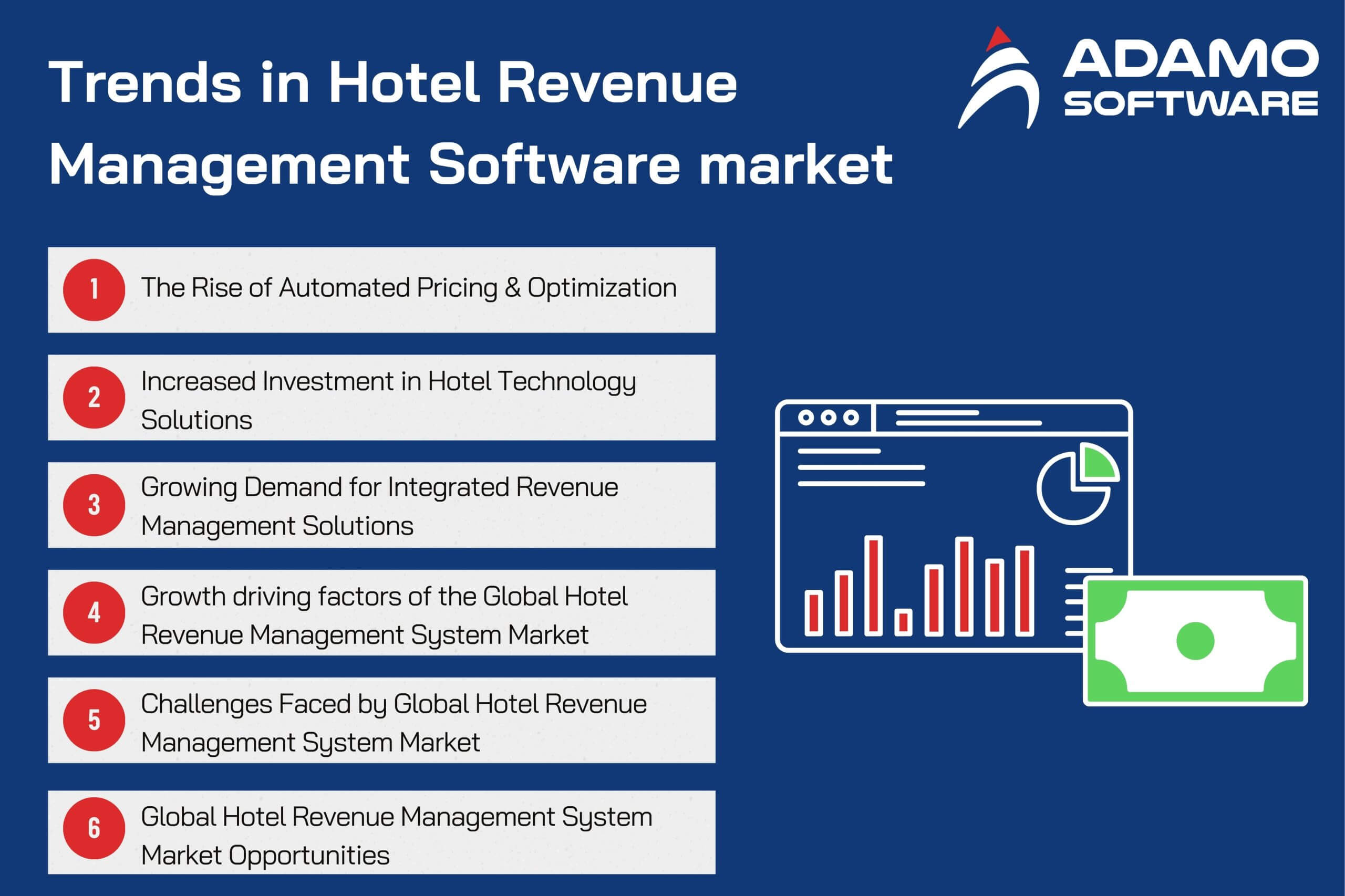
1. The Rise of Automated Pricing and Optimization
Revenue management systems that provide automated pricing and optimization capabilities are becoming increasingly popular in the hospitality industry. By using machine learning algorithms, these capabilities can evaluate current data on variables like competitor pricing, demand changes, and historical patterns. This eliminates manual calculations and human error while allowing hotels to change room rates to optimize revenue and occupancy dynamically. As the hotel revenue management software market evolves, more sophisticated tools with automated pricing are becoming essential for hotels to stay competitive.
2. Increased Investment in Hotel Technology Solutions
The hotel revenue management software market is witnessing a surge in integrated solutions that enable hotels to manage revenue seamlessly. Hotels are increasingly recognizing the strategic benefits of investing in advanced technology solutions. Revenue management systems are one of the key drivers of this trend. The growing need for data-driven decision-making and operational efficiency is a key driver of this trend. Revenue management systems give hotels useful insights into consumer behavior, industry trends, and competition. This helps them improve pricing strategies and stay ahead of competitors. Technology investments are essential for achieving these efficiencies with the rapid development of the hotel revenue management software market.
3. Growing Demand for Integrated Revenue Management Solutions
Today, the significant rise in the integrated revenue management system market has driven the demand for its use by businesses. These solutions can provide a holistic view of your hotel operations. Just by combining various functionalities. From central reservation systems, property management systems, and channel management systems. By adopting an integrated strategy, hotels can increase the efficiency of their overall revenue management process by streamlining workflows. It can also enhance data accuracy and make informed decisions across departments.
4. Growth driving factors of the Global Hotel Revenue Management System Market
- Due to the increasing competition in the hospitality industry, there is a growing demand for efficient hotel operations. Along with this, customers expect high-quality services and amenities that are tailored to their needs. Therefore, to meet these demands, you need to invest in technology. It can help you streamline operations, reduce costs, and improve customer satisfaction.
- Hotel revenue management systems (HRMS) are designed to help you optimize your operations. At the same time, to better meet customers’ needs and provide various features that help manage pricing and revenue.
- The increasing demand for convenience and personalization from customers has led to a rise in the preference for technology-driven services. As customers become more familiar with the convenience of technology, they increasingly expect hotels to provide personalized services. Therefore, you need to invest in technologies such as hotel revenue management systems (HRMS) to meet their expectations. It will allow you to automate pricing optimization and revenue management. Contribute to increased profits and improved customer experience.
- The importance of automated pricing and optimization.
- Increasing investment in hotel technology solutions.
- Finally, there is a growing demand for integrated revenue management solutions. The hotel revenue management software market is growing to meet these evolving demands for more personalized and efficient solutions.
5. Challenges Faced by Global Hotel Revenue Management System Market
- First, one of the biggest challenges facing the hotel revenue management system market is the high cost of implementation and maintenance. When implementing a hotel revenue management system, consider the costs involved. These costs may include hardware, software, installation, training, and maintenance. However, the high total cost of ownership makes it difficult for small and medium-sized hotel owners to invest in such systems.
- A further barrier is limited compatibility with legacy IT systems. For example, hotel revenue management systems may need to be compatible or integrate well with legacy IT systems already established in the hotel. Therefore, hotels may require additional investments in hardware and software to ensure compatibility, which may lead to increased costs.
- The lack of skilled human resources also makes it difficult to do business and develop.
- Fierce competition from companies with a reputation in the market or the industry.
- Difficulty in integrating with existing hotel operations.
- Integrating with existing hotel operations is also a key obstacle in effectively adopting hotel revenue management software market solutions.
6. Global Hotel Revenue Management System Market Opportunities
The global hotel revenue management system market is rapidly growing, and there are many potential business opportunities. Hospitality companies can take advantage of these opportunities by providing innovative solutions to the hospitality industry. This can help hotels optimize revenue and improve operational efficiency. Especially allowing them to stay competitive in the market.
The factors driving the hotel revenue management system market are the need for better operational efficiency, cost optimization, and enhanced customer experience. Hotels need solutions that help them streamline their booking process, increase customer satisfaction, and ultimately optimize the utilization of their resources.
On the other hand, the hotel revenue management software market is also driven by the increasing adoption of cloud-based solutions. This is because they can provide hotels with greater scalability, flexibility, and cost savings. Another aspect that has contributed significantly to market growth is mobile technology. Mobile applications are increasingly enabling hotels to improve their customer engagement and operational efficiency.
In addition, the market is also driven by the increasing use of analytics and AI-based solutions. This advanced tool can help hotels gain deeper insights into their customer data. This allows them to optimize their pricing strategies better and increase their profits.
Overall, the hotel revenue management system market increasingly offers many opportunities for companies to capitalize on and has high growth potential.
V. Adamo Software will help you to keep up with hotel revenue management software market

The hotel revenue management software market is constantly changing, making it difficult to stay competitive. Adamo Software is here to help you navigate these changes with ease. Our cutting-edge solutions are designed to optimize pricing strategies and maximize revenue, ensuring your hotel stays ahead of the curve.
With expertise and data-driven insights, Adamo Software equips your hotel with the tools to adapt to real-time market trends. Whether you are a small business or a large chain, we provide tailored solutions to meet your unique needs. Ultimately, it will allow you to focus on what matters most: delivering exceptional guest experiences. Contact us now for a detailed consultation.





